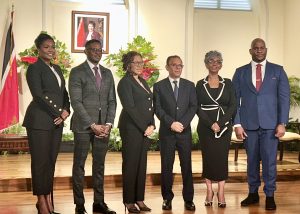By Sue-Ann Wayow
THE Government is facing a herculean task to steer this country through the Covid-19 pandemic and the budget would not be a quick fix to the country’s economic problems.
President of the American Chamber of Commerce Trinidad and Tobago (AMCHAM TT) Patricia Ghany said regardless of the difficult months, citizens should not lose hope.
Speaking at a webinar hosted by AMCHAM T&T on Wednesday to discuss the measures outlined in the 2020/2021 Budget, Ghany said collaboration was needed now more than ever. Minister of Trade and Industry Paula Gopee-Scoon was a main speaker at the event.

Ghany said, “Against the backdrop of another deficit budget and a projected contraction of the economy, estimated at 6.8 percent for 2020, we still feel optimistic for the future.”
The theme for the event was Recovery to Transformation.
One of the main aspects for the budget was improving the Ease of Doing Business which is now key.
Ghany said, “As a pre-requisite of a more attractive business environment, our country’s economic recovery plan must have clear objectives related to improving quality of life and social harmony. We listened attentively to the Minister’s statement and while we reserved clarification on some matters, we were also pleased with some of the measures laid out to improve the ease of doing business in T&T.”

These measures included the thrust towards digital transformation, an initiative AMCHAM TT has been leading with hosting a tech conference and several informative webinars this year.
Ghany said, “Government’s commitment to the digital transformation of the economy in their budget statement is a welcome and positive step that will ensure increased growth and revenue. But we must get it right. Digitising parts of our public sector cannot just be part of the short-term goal to recovery.
“We must build a fully digitally based, enabling economy that will not only improve the ease of doing business but secure our nation’s economic future through the creation of new and exciting jobs, boosting of entrepreneurship, and building the talent pool through innovation and competitiveness.”

She added, “The incentives in the budget through grants for start-up businesses, and tax credits to businesses to invest in tech start-ups or new tech businesses will act as a viable source for revenue, open the job market to many young professionals, and commit our nation’s future to a digitally-based economy where the opportunities seem endless. These are all great initiatives we have championed, and we are proud to see the government move in this direction.”
Government’s commitment to an e-payment gateway for government services, and the use of virtual courts would be transformative for individuals and businesses.
The chamber is awaiting more information from the minister of public administration and digital transformation for specific timelines for implementation, inclusive of appropriate and meaningful consultation with stakeholders.

Other measures welcomed from the budget were the modernisation of the Port of Port-of-Spain, liberalisation of the fuel market, the diversity of the energy sector, encouragement of climate conservation Ghany said more information was awaited on the reform and modernisation of customs.
“Critical in this is a robust and effective risk-based framework that would remove from the examining officer the discretionary power to inspect packages except in very specific circumstances. This will discourage corruption and enhance efficiency.”
She added, “We strongly recommend the introduction of a diminimis value of US $400 for imported items and a return to the 2011 system that allowed commercial packages with a value of less than TT $20,000 not requiring a customs entry. These too will improve the ease of doing business and have a minimal impact of government revenue.”
And the Chamber also called for better collaboration between the Government and the Opposition especially as it relates to legislation.
Gopee-Scoon in her speech reiterated measures outlined by Finance Minister Colm Imbert during the budget on Monday with focus on the private sector.
The themes she focused on were: Providing Greater Private Sector Opportunities, Creating a more robust and Diversified Economy and implementing Digital Transformation to improve the Ease of Doing business and improve efficiencies in the Private Sector.
She said, “These three pillars are not meant to simply help the country weather the debilitating effects of the Covid-19 pandemic, but also transform the economy and be prepared for a more open, competitive world in the near future.”
The measures include increased state housing to boost the construction sector, 20 % of all state housing construction projects will be reserved for small and medium contractors.
The mega projects including the completion of the Solomon Hochoy Highway extension, government will be aiming to strengthen public-private partnerships for these within a two year period.

About the sale of National Petroleum gas stations to the private sector, the Trade Minister said, “This measure will not only engender greater competition by allowing more opportunities for entrepreneurs to own and operate their gas stations and set their own prices, but also allows consumers increased choice.”

She added, “Further to setting the price of fuels, gas station owners and operators would now have the opportunity in some cases to expand into other areas such as retail/convenience stores, which sell food and beverages, automotive goods and services, thereby creating new pockets of economic activity. Increased gas station ownership will also allow the private sector to own prime real estate in strategic areas across Trinidad and Tobago.”
She added that the manufacturing sector will remain key and government will support small, medium and large businesses to double manufacturing exports in certain sub-sectors by 2024 and seek to expand employment and increase the sector’s contribution to GDP beyond 19%.
![]()











